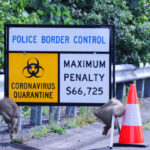Queensland Premier Referred to Human Rights Commissioner

Queensland Premier Anna Palaszczuk has come under plenty of fire from Australians over the past 18 months or so, as a result of her snap border closures as well as the ‘double-standard’ applied to granting exemptions for entering Queensland, with sports stars and celebrities favoured over Queensland residents and other Australian citizens.
Now, the Queensland Government has been referred to the Human Rights Commissioner for potential breaches of the Human Rights Act in denying Queenslanders the right to come home.
Queensland Opposition Minister Jarrod Bleijie has asked the Queensland Human Rights Commissioner, Scott McDougall, to “investigate the allegation of a human rights breach by the Palaszczuk Government regarding border restrictions that are denying Queenslanders their right to lawfully return to Queensland.”
Alleged breach of Queensland’s Human Rights Act
Mr Bleijie submits that refusing Queensland residents to the state breaches section 58 (1) (a) and section 58 (1) (b) of the Queensland Human Rights Act of 2019, which make it unlawful for a public entity to make a decision incompatible with human rights, or which fails to give proper consideration to a human right.
He also argues that every person within Queensland has the right to move freely within the state, enter it, leave it, and to choose where they live.
The Queensland Government has not only locked out it’s own residents during it;s latest harsh border closures, there have been instances of residents who have been unable to permanently relocate to the Sunshine State, and many instances where residents in Northern New South Wales have been stopped from entering Queensland, even for medical reasons, or to visit critically ill or dying family members.
Only recently, HR Commissioner McDougall himself called on the Queensland Government for more transparency around Covid border exemptions, and for a more consistent approach.
‘Hundreds of complaints’ against QLD border policies
Mr McDougall said his office has fielded hundreds of complaints over the handling of exemptions and he believed there were a significant number of examples where compromise could have been met. He said there were also a number of examples which favoured celebrities and people with a media profile, and urged the Queensland Government to consider other options, such as home quarantine, to take the pressure off the hotel quarantine system.
Only recently the Queensland Government denied a request from a family with a sick child returning from treatment at Sydney Children’s Hospital to be flown by a private charter flight provided by charity organisation Angel Flight straight from Sydney to their remote property, where they were prepared to quarantine.
Last year a baby died, when an exemption to get the mother to Queensland failed to arrive in time. There have been other examples too — people relocating from interstate stuck in limbo, having sold up and packed up their lives, unable to get places in hotel quarantine. Recently a Queensland Policeman was charged with misconduct for allegedly trying to sneak his daughter over the border.
Commissioner McDougall has periodically raised concerns over the Queensland Government’s approach to pandemic management, warning that a public health emergency is not a “blank cheque to override individual human rights”.
The erosion of civil liberties in New South Wales
Here in New South Wales, there has been a lot of concern over the public health laws that have been implemented during Covid, many of which severely restrict our freedom of movement and association and give police unprecedented powers, punish people with heavy fines, as well as change the way the court system operates, which have led to justice delays.
And this is one of the significant problems of not having a national approach, and leaving the States and Territories in charge of pandemic management within their jurisdictions.
Prison for the unvaccinated
This has recently been highlighted by the planned introduction of vaccination passports / certificates in New South Wales, which are still being debated at a Federal level after a number of Federal MPs expressed concerns about using them domestically, because they go against a number of the key principles of democracy and could lead to discrimination. In New South Wales, the Government has threatened prison time for unvaccinated people if they enter venues. This is not happening anywhere else in Australia.
This time last year we were all fairly understanding of the ‘unprecedented time’ we were facing and we were relatively accepting of ‘‘unprecedented measures,’ put in place to deal with the situation. Originally, many of us coped with severe social and work restrictions considering them a small price to pay to stamp out a serious health threat, but increasingly the NSW Government have been implementing social controls through its State of Emergency Powers, without the full, robust democratic process.
And, as has been pointed out many times, these rules are implemented under the guise of pandemic management, but the ‘health advice’ which they are supposed to be based upon is scant and, at times, confusing.
Furthermore, originally the plan behind lockdowns was to slow transmission to protect the health system, but very little investment has been made by the Government to sure up the health system in order for it to cope with Covid, which it now appears, is going to be around for some time to come.
‘Once power is gained, it is not often relinquished’
The problem is that none of us know how long these laws will be in place. Lockdowns in Greater Sydney are due to ease over the coming weeks, but there could still be Covid hotspots and transmission spikes which will undoubtedly put some areas back into lockdown. While some laws will definitely have ‘sunset clauses’ (a time which they will be changed, or rescinded), it’s important that we get more clarity and transparency from Governments.
The goal of zero cases has long been abandoned, with leaders now realising that we are going to have to learn to cope, but we also need more clarity about what the Government is considering in terms of alternative strategies to deal with Covid-19.
Lockdowns and domestic border closures have not only all but killed the economy, they’ve created a number of ‘shadow pandemics’: increased mental health issues, increased domestic violence, children falling behind at school, increased homelessness … and the list goes on.
Human rights are not comprehensively protected in NSW or at the Commonwealth level. While Australia does have an obligation to protect and promote the human rights contained in these treaties, without a specific Bill of Rights, people don’t really understand their rights, and there are limited protections in place under other pieces of legislation to hold governments accountable.







